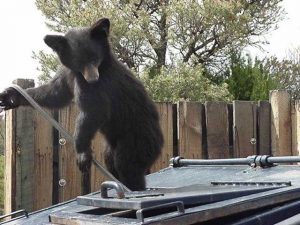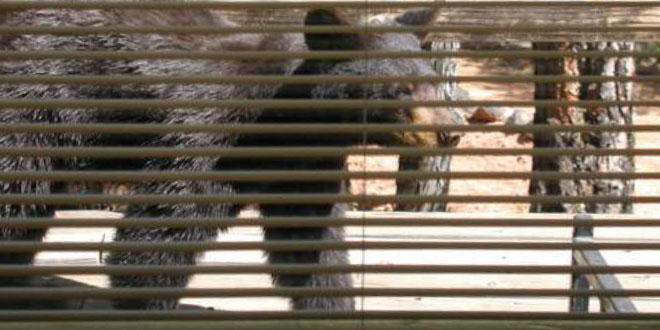Human nature can lead us to believe that when we feed wild animals we are helping them. In reality we are causing them more harm than good. In the natural world, bears are very good at finding food sources on their own that help them maintain a balanced diet, without becoming habituated to people and residential environments.
As the weather warms up, human activity increases and bears starts looking for food, the New Mexico Department of Game and Fish would like to remind the public that it is never acceptable to feed bears or other wildlife. Bears that are intentionally or inadvertently fed items that are not natural to their diet, such as cracked corn or pet food, can quickly become habituated to receiving food and may become too comfortable with people and residential areas. This can cause bears to display nontypical behavior.
“When you see a bear, just leave it alone,” said Corporal Curtis Coburn with the Ruidoso Supervisory District of the Department of Game and Fish. “We don’t want people to approach wild animals. It’s never a good idea, especially trying to feed them. Once a bear associates humans with food, they lose their fear of people and it becomes a problem. We want to keep everyone, including the bears, safe.”

People can both intentionally and unintentionally feed bears. Coburn advises people to reduce potential food sources for bears by always closing dumpsters and remembering that even birdfeeders can easily attract a bear. “Whenever we provide food for other wildlife, we should still consider the potential predators we could attract. And not only bears, but also bobcats, skunks or raccoons,” he said.
Bears who are accustomed to receiving food regularly from humans and do not get the food they expect, may go looking for different sources. Everyone is reminded to secure all pet food, bird feeders, livestock feed, fruit and garbage so bears do not become attracted to, and dependent on, human provided food sources.
People are encouraged to call the Department and report a bear that exhibits aggressive or unusual behavior. Bears that appear to be moving through the country should be left alone and there is no need to report them.
If you live in bear country:
• Keep garbage in airtight containers inside your garage or storage area. Place garbage outside in the morning just before pickup, not the night before. Occasionally clean cans with ammonia or bleach.
• Remove bird feeders. Bears see them as sweet treats, and often they will look for other food sources nearby.
• Never put meat or sweet-smelling food scraps, such as melons, in your compost pile.
• Do not leave pet food dishes out at night and feed pets indoors when possible.
• Thoroughly clean grills, including the grease trap after each use and store in a secure location, like a garage. Bears can smell sweet barbecue sauce and grease for miles.
• Never intentionally feed bears to attract them for viewing.
As bear activity increases, and as COVID-19 related travel restrictions are lifted, people should be even more diligent when venturing into bear country. Always pay attention to your surroundings.
The Department offers the following suggestions if you plan on camping in bear country once restrictions are lifted:
• Keep your camp clean, and store food and garbage properly at all times. Use bear-proof containers when available. If not, suspend food, toiletries, coolers and garbage from a tree at least 10 feet off the ground and 6 feet out from the tree trunk.
• Keep your tent, sleeping bag and gear free of all food smells. Store the clothes you wore while cooking or eating with your food.
• Sleep a good distance from your cooking area or food storage site; 100 yards is recommended.
Here are some ways to protect yourself if you encounter a bear:
• Stop, and back away slowly while facing the bear. Avoid direct eye contact, as the bear may consider that a threat. Do not run. Make yourself appear large by holding out your jacket. If you have small children, pick them up so they don’t run.
• Give the bear plenty of room to escape, so it doesn’t feel threatened or trapped. If a black bear attacks you, fight back using anything at your disposal, such as rocks, sticks, binoculars or even your bare hands. Aim for the bear’s nose and eyes.
• If the bear has not seen you, stay calm and slowly move away, making noise so the bear knows you are there. Never get between a mother bear and her cubs.
If you have information about someone who is feeding bears, or other wildlife, call Operation Game Thief 24/7, (800) 432-4263. Callers can remain anonymous.
 New Mexico Wildlife magazine Conserving New Mexico's Wildlife for Future Generations
New Mexico Wildlife magazine Conserving New Mexico's Wildlife for Future Generations
